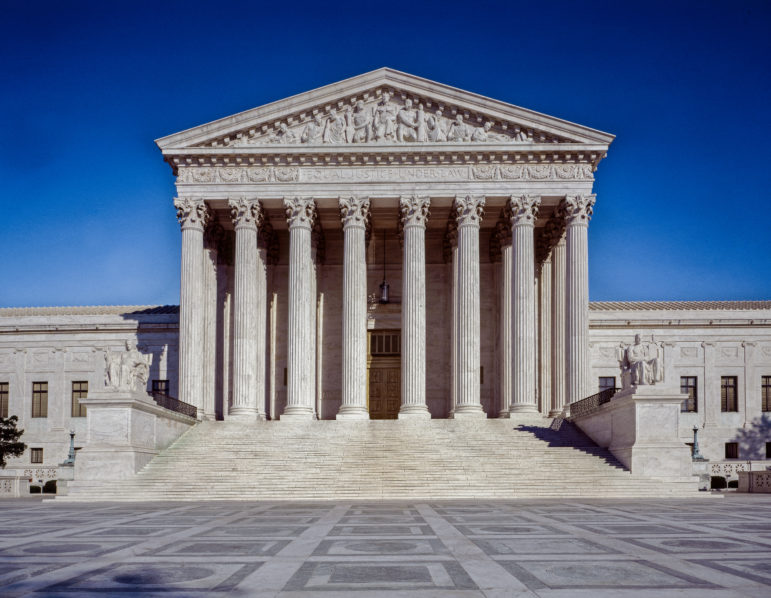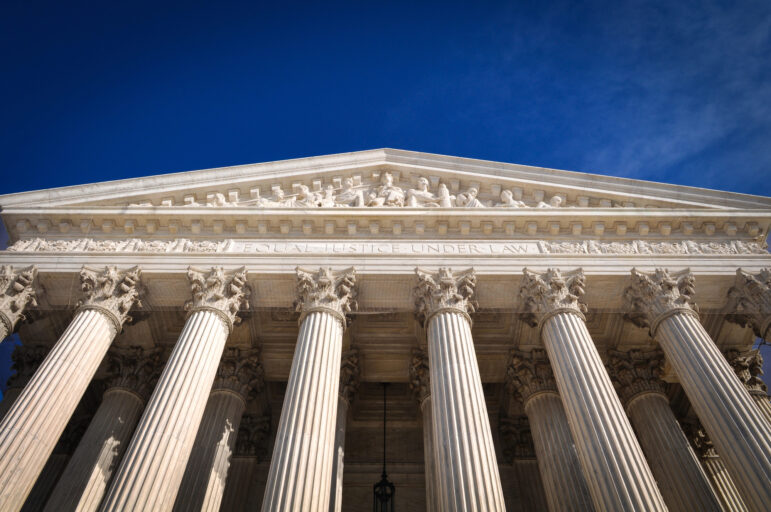WASHINGTON – The U.S. Supreme Court heard oral arguments this morning in Mahmoud v. Taylor, a case that could reshape how public schools handle religious objections to inclusive curricula. The case extends beyond legal questions to the core issue of creating truly inclusive public schools, especially for LGBTQIA+ students and potentially impacting minority faiths. The fundamental question of the case is, do public schools infringe upon parents’ religious exercise rights when they require elementary school children to receive instruction on gender and sexuality that conflicts with their parents’ religious beliefs, without providing notice or the opportunity to opt out?

United States Supreme Court Building By Carol M. Highsmith – Library of CongressCatalog: http://lccn.loc.gov/2011631106Image download: https://cdn.loc.gov/master/pnp/highsm/12900/12912a.tifOriginal url: http://hdl.loc.gov/loc.pnp/highsm.12912, Public Domain, https://commons.wikimedia.org/w/index.php?curid=91285025
In October 2022, Montgomery County Public Schools in Maryland added LGBTQ-inclusive books to its English Language Arts program. These books, called “Storybooks,” included characters and themes related to sexual orientation and gender identity. For example, pre-K students read Pride Puppy! and students in grades K–5 read Born Ready: The True Story of a Boy Named Penelope.
At first, the school district allowed parents to get advance notice about these lessons and opt their children out if the content went against their religious beliefs. This was in line with existing district policies for religious accommodations. But in March 2023, the school board suddenly changed its approach. Without much explanation at the time, they stopped providing notice or allowing any opt-outs. Later, they said the change was due to concerns about too many student absences, classroom disruptions, extra work for teachers, and the risk of singling out students represented in the books.
Parents from a range of religious backgrounds—including Muslim, Roman Catholic, and Ukrainian Orthodox—filed a lawsuit against Montgomery County Public Schools after the district ended its opt-out policy in 2023. The parents argue that requiring their children to take part in lessons involving LGBTQ+ themes, without the option to opt out, violates their religious freedom and rights as parents.
The families are represented by the Becket Fund for Religious Liberty, a conservative legal organization known for challenging laws related to LGBTQ+ and reproductive rights. Becket has been involved in major Supreme Court cases such as Burwell v. Hobby Lobby Stores, Inc. (2014), where the Court ruled that for-profit companies could refuse to cover contraception on religious grounds, and Dobbs v. Jackson Women’s Health Organization (2022), which overturned the constitutional right to abortion.
Eric Baxter, a senior attorney at Becket, criticized the school district, saying it was “cramming down controversial gender ideology on three-year-olds.” During oral arguments, Baxter referred to the district’s practice as “indoctrination” of children, particularly targeting those of a vulnerable age.
Montgomery County Public Schools (MCPS) defended its policy change ending parental opt-outs from certain classroom readings, arguing that simply exposing students to diverse ideas does not violate religious freedom. The district expressed concerns that allowing opt-outs led to rising absenteeism, classroom disruption, and increased stigma for LGBTQ+ students.

Courtesy DepositPhotos
Originally, MCPS permitted families to opt out of lessons involving books with LGBTQ+ themes. But in 2023, facing a “growing number of opt-out requests,” the district reversed course. Officials cited logistical challenges in managing opt-outs and said they risked violating anti-discrimination laws. The district emphasized that it had followed a “public, participatory selection process” to choose books and continues to welcome parental feedback.
The district also stated that the books—such as Pride Puppy!, Uncle Bobby’s Wedding, Born Ready: The True Story of a Boy Named Penelope, and Love, Violet—are not used in lessons explicitly about gender or sexuality, but rather in read-alouds and literacy activities to support inclusive learning.
Authors of the books, writing through PEN America, defended their work, saying: “We created our books with love and care… To act otherwise is harmful and sends a devastating message to students: that their lives and families are so offensive they can’t even be discussed in school.”
In August 2023, a district judge denied the parents’ request for a preliminary injunction to restore the opt-out option. The Fourth Circuit Court of Appeals upheld that ruling in May 2024, and the U.S. Supreme Court agreed in January to take up the case.
“Even if their children’s exposure to religiously offensive ideas makes the parents’ efforts less likely to succeed,” the judge wrote, “that does not amount to a government-imposed burden on their religious exercise.”
Scholars have noted that the school district’s practice involves no coercion. Rather, the case centers on some parents’ efforts to prevent their children from encountering a range of perspectives in the classroom.
During arguments, the Supreme Court’s conservative justices appeared largely sympathetic to religious parents who argue that being denied the ability to opt their children out of certain books amounts to a violation of their religious rights. Justice Amy Coney Barrett noted that the case is “not about exposure, not about books on the shelf…It is about your clients’ sincerely held religious beliefs.”
“This has a clear moral message,” said Justice Samuel Alito, referring to one of the contested books, during a pointed exchange with liberal Justice Sonia Sotomayor. “It may be a good message,” he added, “but it’s just a message that a lot of religious people disagree with.”
The court’s liberal justices pushed back, questioning whether mere exposure to ideas—without compulsion— could truly burden religious practice. Sotomayor pressed the point: “Looking at two men getting married—is that the religious objection? The most they’re doing is holding hands.”
While the court’s 2022 precedent held that exposure alone does not constitute religious coercion, some justices appeared open to revisiting that standard. Chief Justice John Roberts challenged the idea that viewing something cannot infringe on religious beliefs, citing Islamic prohibitions on depictions of the Prophet Muhammad.
“Looking at the image of Muhammad is a serious matter for someone who follows that religion, right?” Roberts asked, highlighting the broader implications of the case.
Tensions occasionally ran high. When Sotomayor tried to interrupt Alito, he snapped, “Can I finish?”
Conservative Justice Brett Kavanaugh emphasized the plaintiffs’ position: “You’re not seeking to prohibit instruction in the classroom,” he said. “You’re just seeking not to be forced to participate in that instruction.”
School officials argued that allowing individual opt-outs would be disruptive and could lead to widespread efforts to sidestep the curriculum on personal or ideological grounds.
The Court itself appeared to sidestep that some religious traditions might want inclusive material shared with everyone.
“Once we say something like what you’re asking for us to say,” warned Justice Elena Kagan, “it’ll be like opt-outs for everyone.”
Mental health organizations have even weighed in. The American Psychological Association warned, “A substantial body of research indicates that inclusive instructional materials that acknowledge LGBTQ+ people and stories as part of the general curriculum reduce student victimization in schools and ameliorate associated mental health issues for student populations. As the largest professional association of psychologists in the United States, the APA is deeply concerned about the mental health effects on students of limiting instruction using books that feature LGBTQ+ characters.”
A decision in the case is expected by the end of June.
The Wild Hunt is not responsible for links to external content.
To join a conversation on this post:
Visit our The Wild Hunt subreddit! Point your favorite browser to https://www.reddit.com/r/The_Wild_Hunt_News/, then click “JOIN”. Make sure to click the bell, too, to be notified of new articles posted to our subreddit.